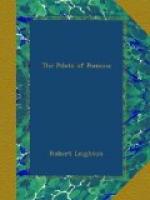My sister Jessie, with evident thought of Captain Gordon, noticed these signs of approaching storms.
But if to her they portended ill, to me they meant good sport; for what could be more favourable to a day’s fishing than a sprinkle of rain and a good westerly wind?
Telling my mother one Saturday morning that I would stay over Sunday at my uncle Mansie’s farm at Lyndardy, I started off with my fishing tackle and my dog, with the intention of catching a few trout in the stream I had so strongly recommended to the schoolmaster.
The dog was certainly no necessary companion for a fishing excursion; but Selta had learned to follow me on such occasions without interfering with my sport, and I got into the way of talking with her, and found comfort in her dumb companionship.
Passing through the hamlet of Howe, I reached the Bush at a point where that wide stream runs into Scapa Flow by the Bay of Ireland. This, I had found, was a favourite resting place for sea trout before running into the lochs, and here I enjoyed good sport for the whole morning.
I fished upstream—as I think a true angler should do—for though, as Andrew Drever held, fishing downward was the easier method of the two, especially with the wind at his back, yet I preferred my own way, just as I preferred fishing with artificial fly to fishing with bait, merely because it was more difficult and more surely exercised my skill.
The third cast I made filled me with an enthusiasm I long had known. A sudden jerk at the line and a fish was hooked. I paid out more line as the trout darted off, then drew in as it slackened again. Once more, as the fish felt the strain, he plunged off. I saw him jump, and his scales flashed in the gray light like a bright blade of steel, a loop of line gathering round him. At length the prize was taken, and a fine sea trout was brought exhausted to the bank.
Thus I fished, now wading to the knees in the rapid stream, now sitting on a large stone readjusting my flies. Before noon the rain fell heavily, but by the time that I reached the Bridge of Waithe my basket was full, and I walked along the road as far as Clouston, the dog following in the wet with drooping, draggling tail, and ears dripping with the rain.
My clothes were wet through and I was cold, and, wishing for shelter and a bite of food, I turned across the heath to Jack Paterson’s croft. I opened the door of the little cottage without knocking, and found Jack and his wife Jean at home, with their family of six waiting for their midday meal. Hilda, the eldest girl, was arranging some wooden dishes on the table ready for the potatoes.
Poor as the place was, I received a true and simple welcome, and I was glad of the shelter and the warmth, for the wind was whistling round the eaves and the heavy rain pelting against the little window.




